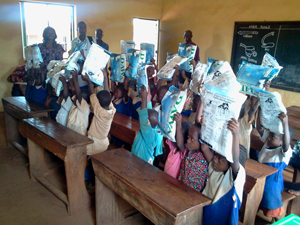In the first round of the pilot, 88 public schools distributed 8,444 ITNs to students and teachers in Obubra Local Government Area, which has a total population of 185,000.

Nigerian students receive mosquito nets to take home. School-based distribution of long-lasting ITNs can help sustain high coverage after campaigns. Source: NetWorks Project, JHU-CCP
The school distribution pilot provided a practical and simple way to introduce ITNs into homes since many of the necessary elements were already in place: students and their families were registered in the school system; schools had adequate storage facilities for ITNs; and educators were highly motivated to take part in malaria prevention activities.
Four grade levels that were three years apart were chosen to ensure that most households with children would receive at least one ITN every two to three years. Key government, education, and health leaders were involved at all stages. During regular monthly teacher meetings, teachers were trained on correct ITN use.
In the first round of the pilot, 88 public schools distributed 8,444 ITNs to students and teachers in Obubra Local Government Area, which has a total population of 185,000. PMI provided critical support for this program, including ITN procurement, logistics, and implementation efforts.
The program reached all targeted school children with minimal logistical burden and no loss of mosquito nets. Keys to success included early and frequent engagement with all stakeholders; commitment from the educational sector; and the ability to quantify ITNs, store bales of nets, and train personnel using existing systems.
